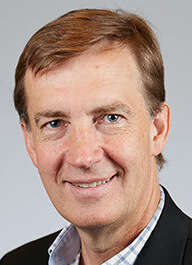 "
"
Graham Peaslee is a professor of physics and concurrent professor of chemistry and biochemistry, whose research focuses mainly on applications of nuclear physics. Peaslee’s commitment to the principles of education is a common thread within all of his responsibilities. Whether he is teaching undergraduates formally in a lecture setting, educating the scientific community about the world through his research or helping students to develop life skills that will guide them both in and out of the classroom, Peaslee's love of learning is evident.
You are widely published and heavily involved in research. Can you share a bit about your past research projects?
My research is basically using nuclear science techniques to measure things. One project that made the news was the presence of hazardous chemicals on the surface of paper wrappers used by various fast food chains. Food is placed in paper wrappers, which are coated with PFAS, which is toxic, to prevent grease coming through. We exposed that because we developed a technique to screen for it in thirty seconds. We published a paper saying that a large percentage of these wrappers were fluorinated. These wrappers went into the landfill, where the chemical runoff could make its way into drinking water. When these findings hit the news, they went viral. It was not intended to be a policy making paper, but a senator picked it up and wrote to the different companies asking them their policy and timeline for removing these chemicals. Many companies made changes as a result. That was a good feeling. We continued this research by investigating the presence of the same chemical in firefighting gear.
What has been most difficult about teaching during the coronavirus pandemic? Are there any unexpected positives?
The most difficult part is the lack of student interaction: we’re doing it all by Zoom. I miss using my whiteboard; usually it is covered with equations from students working problems at office hours, and now it’s rather naked. There have been unexpected benefits. We decided to implement a flipped classroom after attempting to deliver video lectures during the online portion of the spring semester. The flipped model has allowed us to spend more time in class focusing on the aspects of the material that students struggle with the most. I would love to go back to regular teaching, but I would like to keep the flipped classroom because it allows me to be more helpful to students.
Do you have any advice for current undergraduates, perhaps inspired by your own time at college?
I think it's important for students to realize they don’t have to be perfect. My first two years as an undergraduate, I had a lot of fun. I took organic chemistry, and I could’ve gotten an A, but I only studied three nights: the night before each exam. I didn’t become a serious student until my junior year. I went to the library “dungeon” and studied really hard for a few hours every night. I was afraid the parties would miss me, but they didn’t even notice I was gone and that was eye-opening. Take this time to learn life lessons. I try to give my students the type of fatherly advice that I give my own kids: take this time to learn life lessons. Learn to budget your time.